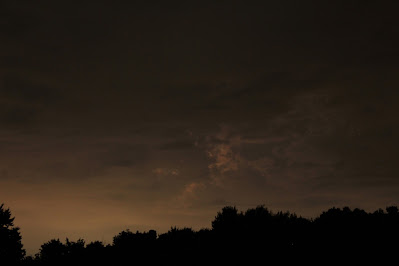Sitting on a chair with a book in my hands, I couldn’t help but keep glancing up at the sky. Nearing sunset, the clouds seem to be getting darker and thicker rather than dissipating the way I had hoped. I shook my head and returned to my book.
This evening brings back many memories and my mind drifted away from the book and slipped back into the past.
I was sitting outside the Wagman Observatory for a reason. In an hour or two, the moon would be occulting, or covering over, the bright star Antares. This happens every night as the moon's orbit around the earth brings it in front of background stars. They rarely are bright ones like Antares. This occultation could be visible by a person with good eyesight! To watch an event like this through a telescope would be exciting. Watching motion in the generally static sky is always fun to see!
I was planning on watching through the 11” Brashear telescope. The moon and Antares could both be seen with binoculars at sunset after I arrived, but sadly, the clouds followed me up to the hilltop. Every so often a clear patch of sky would appear only to quickly disappear again. I had to chuckle, it is such a common occurrence here in Pittsburgh.
“Back in the day” as the saying goes, I used to go on car trips to observe and time occultations, especially grazing occultations! This is when the moon's orbit takes it close enough to a star that it disappears and reappears as the moon's mountains cross in front of it. If you’re lucky you might see this happen more than once. To observe this, you have to be within a narrow strip on the earth. Outside of this strip, you will either see the star miss or else just disappear behind the lunar disc. Positioning is very important!
John Holtz is the man in the astronomy club who coordinated these excursions. Often we would drive for an hour or more to get to a location. The planning involved looking at topographic maps and locating a spot that could be accurately defined. We weren’t using GPSs in those days. Hopefully there would be a spot to pull off and a flat area big enough to set up a telescope. Along with our telescopes we brought a tape recorder and a shortwave radio so we could listen to WWV to get an accurate time. The results would be sent to IOTA, the International Occultation Timing Association to be added to other reports from other observers.
Living in the western end of Pennsylvania unfortunately brought a lot of disappointing trips. Clouds and poor weather seem to occur ANY time an astronomical event happens in this area. (I say this with jaundiced eyes.)
Section of a map plotting a graze on
April 2nd, 1994 around Dorseyville
For me, the work before an event was always fun. Locating these narrow strips of visibility on maps; defining where the best line and where the outside strips would be, marking the maps and then deciding where I would go was something I looked forward to. In the days before Google Maps, we relied on our “old” maps to define where we’d go. The drive there was fun also, usually in the middle of the night, not knowing what to expect when I arrived.
After many a long drive, I would watch the clouds drift by with no sight at all of the moon, let alone the star. I’d wait until after the event would have happened before I tore down my equipment, just in case the sky might clear. Then, I’d hit the road towards home again.
BUT, every so often, things would go as planned. The sky would be clear, there would be a nice place to set up my telescope, no cars would drive by shining their lights into my eyes and no policemen would stop by just as the star was disappearing. The radio would catch the time station clearly and we could easily see the occultation. I would drive home feeling victorious! These trips made all the other failures worthwhile. The failures just made the successes that much more exciting!
Back to the present, the occultation was clouded over. The next night, I was sitting in the same spot. I was with some fellow club members and we were hoping that the clouds would clear up so that our star party could continue as planned. Pittsburgh weather and astronomy are archrivals and sadly the weather is usually the bad guy. In the meanwhile, I sit, read and talk with my friends as we wait for the clouds to part.






1 comment:
I bet it makes it so much more fun when the weather does cooperates..
Post a Comment